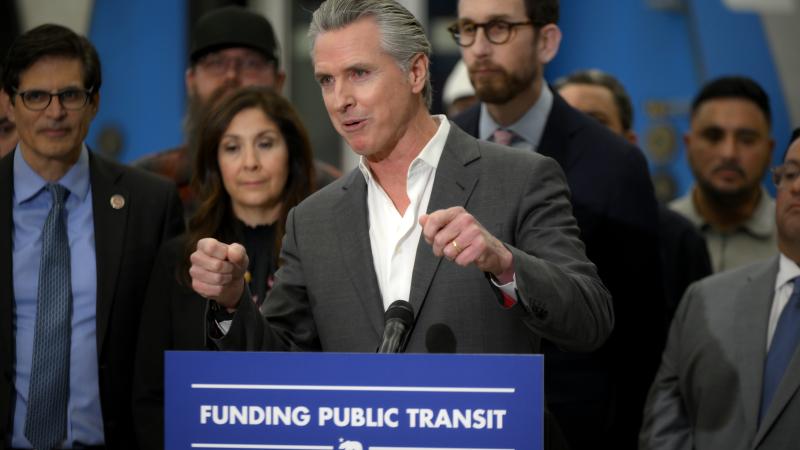House Armed Services Democrat: Biden's defense budget 'doesn't build the force we need'
"I'm very, sort of, very discouraged by what I've seen so far this year in the process of the NDAA," said Rep. Elaine Luria (D-Va.).
Rep. Elaine Luria (D-Va.) and Rep. Michael Waltz (R-Fla.), members of the House Armed Services Committee, are not satisfied with President Biden's proposed $813 billion defense budget.
Arguing that the budget proposal "doesn't build the force we need," Luria questioned the military's new focus on transitioning combat vehicles to fully electric by 2050.
Biden's request for the Pentagon's budget is 4% higher than the $773 billion FY2022 defense budget.
Former President Donald Trump often touted that his administration "rebuilt" the U.S. military after the Obama years.
Luria said the Trump administration adopted a strategy of "deterrence by denial," meaning administration officials laid out the consequences a country like China would face if it tried to invade Taiwan.
"Do we have a deterrent?" she asked during a discussion on "Building a Budget for an Increasingly Dangerous World" hosted by the Jewish Institute for National Security of America (JINSA). "Do they think it's actually not possible because we're there and there are risks, or are we counting on the fact that they think the punishment on the other side of it is going to be too great, like, we're not going to do this because the consequences will be too great?
"This national defense strategy really leans in on this idea of integrated deterrence. And our colleague, Mike Gallagher, if you've watched the hearings, has really hammered away on what is this integrated deterrence? How does it work? Was it effective with regards to Russia's unprovoked invasion of Ukraine?"
Luria wants to see Biden administration officials answer, under oath, if they are abandoning that strategy of deterrence by denial.
"I really think," she said, "that we have a lot of hard questions to ask in Congress, you know: Are you abandoning the idea of deterrence by denial? And is that why you're gutting the force and reducing the number of platforms?
"So in my opinion, the answer is no, this does not build the force that we need, either in the near term, especially in the near term, with regards to our current threats ... I'm very, sort of, very discouraged by what I've seen so far this year in the process of the [National Defense Authorization Act]."
Waltz agreed with Luria's assessment of Biden's budget, posing a series of what he called "existential" questions: "How do we outmatch China, continue to deal with, at least from a nuclear standpoint, a dangerous Russia overlaid with North Korea and that ticking time bomb there; Iran racing towards a nuclear weapon and then potentially an outbreak of a nuclear arms race in the Middle East and a still very dangerous, and now growing in danger, global terrorism threat that is festering in what I'm calling the Taliban caliphate?
"How do we do all of those things, overlaid with $30 trillion in debt and climbing? I don't think this budget does it. The comptroller admitted in our last posture hearing that he used a 4% figure. He wouldn't say whether that came from OMB or if that was internal, but regardless, this budget moves backwards just in terms of the top line."
Waltz, an Army veteran, said the U.S. must learn from the Biden administration's failure to deter the Russian invasion of Ukraine.
"I'll say on deterrence, the integrated deterrence failed when it comes to deterring Putin in Ukraine," he said. "I think we need to acknowledge that, embrace it, look at it with open eyes and apply it to Taiwan. Having a tough, unified global response after a city like Taipei is leveled isn't a strategy that we want to resource."
Waltz, ranking member of the House Armed Services Readiness Subcommittee, painted a dire picture of the current state of "readiness" across the military, but particularly the Navy.
"I don't want to call it a crisis, but we have a real problem with readiness across all of our services," he said. "But I think it's particularly acute in the Navy right now. They're attempting to get at it, but I don't think they're adequately describing the risks down the road."
The Republican lawmaker also questioned why the Army recently outlined a strategy to make all combat vehicles fully electric rather than securing broken supply chains.
"I certainly support a diverse energy source, we need that," Waltz acknowledged. "But to take them all electric by 2050, yet nothing in the strategy talks about securing those supply chains, much less the debate of having the most lethal vehicle on the battlefield, not the least carbon emitting. So, yeah, we have a lot of work to do."
















